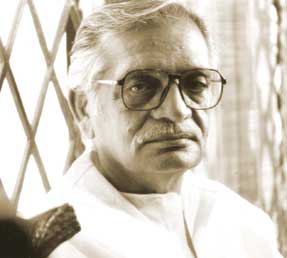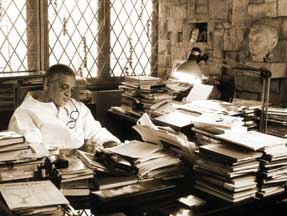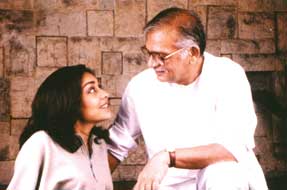Arts
Beedi Jalaile! Gulzar … Uncensored!

In this exclusive interview, Gulzar airs his personal views on why poets need not always look and behave like love-lorn losers, why today's music and music-makers should not be summarily dismissed and why women film-makers have their own special space in Bollywood....
|
Gulzar has always been special. Playing out his chosen role as a poet, lyricist and film-maker par excellence, he has always been unique, consciously avoiding the spotlight, passionately engaged in artistic communion with his muse. However his reticence and life-in-the-shadows should not be mistaken for indifference or detachment to issues that matter. Frank and forthright, Gulzar has strong opinions, views and takes on a variety of subjects and he articulates them, only as he can.
We begin with the type casting of poets and how they are popularly perceived to be in a certain, pre conceived mould…. Any break from that image is considered blasphemy. When Kajra Re burst on the scene, a couple of years ago (and threatened to become the national anthem, much like Beedi Jalaile, later!) an entire group of people were shocked that I, of all people, could write such populist and chalu stuff! Wasn’t I a Poet, someone who wrote about love, longing and loss … about emotion, sentiments, feelings and romance? This was such down market sadak chhaap stuff! From the maker of Aandhi, Mausam, Ijaazat, Mere Apne and Mirza Ghalib, this was the last thing they expected! I was both amused and irritated. My point is: why don’t people abandon their ghisa-pita and archaic ideas about how poetry should be written and how poets should look and live! For gawd’s sake , this is year 2008, not the fifteenth century! The image that emanated from the courts and the feudal period unfortunately seems fixated in their collective mind … why can’t a poet enjoy dancing, hit the disco, play tennis (or tabla), sleep early, get up early to go jogging, drink in moderation and engage in academic pursuits? Because it goes against the image!
Over time, romantic notions about poets and poetry have embedded themselves so deeply and firmly in the public/popular psyche that anything that remotely conflicts with their perception and imagined version of a poet or his poetry, leads to a solid shake-out! To discerning, educated, evolved and intelligent viewers, both Kajra Re and Beedi Jalaile, were enjoyed as hundred percent poetry, the words, sensibility and feel totally embracing and in-sync with the requirements of the scene and the context it related to. It was focused, relevant and made-to-order lyrics. I guess, one of the biggest reasons why both of them caught fire was also because they were played out by (Amitabh, Aishwarya, Abhishek, Bipasha) red-hot stars, in flamboyant style. I am not complaining… nor are Shaad and Vishal! Up next is the popular trend of badmouthing today’s music directors while constantly celebrating the music makers of the past. Gulzar begs to differ…. It is fashionable today for one kind of people (who consider themselves intellectuals and culturally evolved) to trash most of the music and music-directors of today, flashback to maestros of yester years and rhapsodise about their melodies. I find it insensitive, unfair and totally uninformed because every single piece of work that appears in the public domain has to be contexted before being congratulated or condemned. The easiest thing on earth to do is pass casual and frivolous value-judgment. Fortunately opinions, are not facts; they remain opinions!
Before dismissing today’s music – and raving about Madan Mohan, Naushad, Roshan, Shanker Jaikishen, Hemant Kumar, S.D.Burman and gang – it would be useful to remember the time and environment those greats operated in. The fifties, sixties, even seventies were periods that were leisurely. The insane pace, buzz, crazy competition, a zillion entertainment avenues [TV, Internet, video, viral) changing target profiles, a young, promiscuous, impatient audience-base (more driven by exciting novelty than loyalty) technological boom, open markets, globalization, consumerism … none of these touched their pure sensibilities. They worked on one or two films a year, had their space and did their work in secure and uninterrupted fashion. Naturally they turned out quality material. Today’s scene is totally different. We produce over 700 films a year. It’s a jungle out there with every single composer – old and new – eyeing the prized projects. It’s a nano-second world and everything is wanted yesterday. Quality with speed is the mantra and only the ones who can deliver in that mode, consistently, is the one wooed. Don’t forget the music-director is responsible only for the music, not the movie, and his work has to relate to the tone and tenor of the movie’s soul. Not all film-makers are music-literate or have subjects that are music-friendly. This makes their task doubly difficult because its now their job to rise above it and deliver something that is both memorable and – more importantly – popular! In this complex, bewildering and crazy scenario (which the old masters never had) we still have an A.R.Rehman, Shanker-Ehsaan-Loy, Vishal Bhardwaj, Shantanu Moitra, Salim-Suleman, Preetam, Jatin-Lalit, Anu Malik, Vishal-Shekhar …. Admittedly not all of them produce fabulous music all the time, but then, since music cannot manufactured but created, there are a number of intangibles that influence the end-product – artistic compatibility, heading the list – that must be taken into account before summarily passing judgement. Can a Mohabbat ki jhooti kahani pe royen, Kali ghata chaye mora, Hum tumse mohabbat kar ke sanam, Bhoolisi Dastan, Aapki nazron ne samjhan, Waqt ne kiya, Na jao saiyaan, chudhake baiyyan, Pyar par bas to nahin mera, Jalte hai jiske liye, Jo vada kiya … work in today’s SMS-driven times? It is a context thing.
That was then … and nostalgia always holds a special magic. In today’s cut-throat, market-driven here today-gone today times, relevance to both the spirit of the film and the target base addressed, is critical. In this tough environment, my hats off to music-directors, who, despite everything, have the courage, gift and ability, to create music that is wonderfully pleasing and popular! Putting my neck on the block – and with due respect to all those eminent and established greats – I wonder how many of them would be able to provide that kind of brilliant compositions in these times… Finally, a take on women film makers, their fate in Bollywood and why they need to be understood, encouraged, supported and celebrated. There is a notion that Women directors are not taken seriously and remain fringe people, in Bollywood. I don’t think that’s totally true because the whole issue must be seen and understood in the right perspective. Women directors have always entered the industry with seriousness and a definite desire to make meaningful films. Movies that entertain and enlighten, put forth a point of view, present an agenda wrapped in an engaging story.
Men or women, the box-office is seldom gender-sensitive, but yes, traditionally it’s the men’s films that have been more commercially successful. The reason, I suppose, is historical. Men, by nature, are more cued-in to business, money, projections and financial matters. It is of vital importance and they put a huge premium on it. Women, by nature, are far less financially or commercially inclined or savvy and bring a different kind of sensibility to bear on the film. It is usually serious not frivolous, with something to say in a voice and tone that is their very own. Their subjects and treatment also are unlikely to embrace popular/masala territory, so the audiences are going to be, of the evolved, intelligentsia kind – not the barnstorming aam junta! Farah Khan is a hugely popular exception with two mega-hits, but her films, consciously define unadulterated, populist entertainment, with the biggest stars, sets, music and razzmatazz galore! More power to her elbow! For me – and a significant body of viewers – Women directors bring something very special, different and unique to the table. 36 Chowringhee Lane, Mr & Mrs Iyer, Sparsh, Chashme Buddoor, Filhaal and a host of others, present themes and treatment that offer a whole new world of rich cinematic experience. Today, with the climate changing, multiplex movies addressed to new-age audiences with off-beat themes and non-star cast finding acceptance, this unsung, neglected, under-rated and ignored breed could very well re-write the script to find their long overdue place in the sun. I wish them, Godspeed! |





